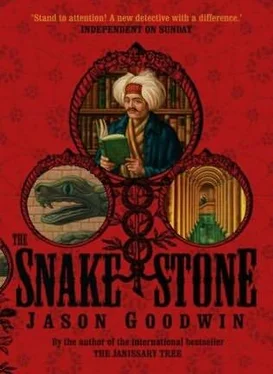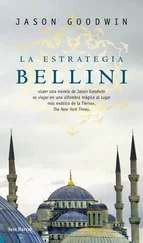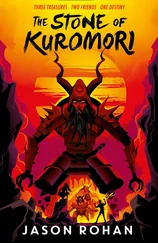Jason Goodwin - The snake stone
Здесь есть возможность читать онлайн «Jason Goodwin - The snake stone» весь текст электронной книги совершенно бесплатно (целиком полную версию без сокращений). В некоторых случаях можно слушать аудио, скачать через торрент в формате fb2 и присутствует краткое содержание. Жанр: Исторический детектив, на английском языке. Описание произведения, (предисловие) а так же отзывы посетителей доступны на портале библиотеки ЛибКат.
- Название:The snake stone
- Автор:
- Жанр:
- Год:неизвестен
- ISBN:нет данных
- Рейтинг книги:4 / 5. Голосов: 1
-
Избранное:Добавить в избранное
- Отзывы:
-
Ваша оценка:
- 80
- 1
- 2
- 3
- 4
- 5
The snake stone: краткое содержание, описание и аннотация
Предлагаем к чтению аннотацию, описание, краткое содержание или предисловие (зависит от того, что написал сам автор книги «The snake stone»). Если вы не нашли необходимую информацию о книге — напишите в комментариях, мы постараемся отыскать её.
The snake stone — читать онлайн бесплатно полную книгу (весь текст) целиком
Ниже представлен текст книги, разбитый по страницам. Система сохранения места последней прочитанной страницы, позволяет с удобством читать онлайн бесплатно книгу «The snake stone», без необходимости каждый раз заново искать на чём Вы остановились. Поставьте закладку, и сможете в любой момент перейти на страницу, на которой закончили чтение.
Интервал:
Закладка:
Calm yourself, she murmured, wading on. Concentrate on the detail. Roman bricks. A later repair, using cruder materials; perhaps builders had crashed through the roof in some remote age. The Turks seemed to have rediscovered the secret of Roman cement, she thought. The walls were bare; nothing could grow down here.
Amelie Lefevre. An archaeologist. Like my husband.
She began to count her steps.
She counted a hundred, two hundred. At five hundred paces she began to feel the weight of the city pressing down on her, slowly sealing off the distant mouth of the tunnel. She stopped counting.
This is the Snake, she told herself. It has stood firm for a thousand years, a lost feat of Byzantine engineering.
I’m in good hands: Byzantine workmen, a Renaissance scholar-and Maximilien Lefevre.
She had read it all in Yashim’s book; the book her husband had hidden in his apartment. The book that Max had always meant her to find.
The reel snagged in her hand. She looked down and took another out of her pocket. She tied the ends of the thread together, curved her fingers over the new reel, and went on.
112
A thought, a memory, was stirring in Yashim’s mind. He leaned against the wall and closed his eyes, oblivious to the people passing in the street.
Amelie had vanished into thin air. The only clue to her plans lay in the book she had taken with her. Gyllius must have identified to Amelie-and perhaps, before that, Lefevre-the location of the Byzantine relics.
Amelie believed in their existence. They lay, she had said, in a hollow space beneath the former church of Aya Sofia. A crypt.
The way to the crypt lay through a network of tunnels that ran beneath the city. Most of them were no bigger than rabbit burrows, but some were big enough to admit the passage of a man. One, at least, seemed to run from the siphon in Balat to the church of St. Irene on the grounds of the Topkapi Palace, where Yashim had seen its mouth. Close to where Gyllius claimed to have gone down beneath a man’s house and flitted through a cavernous cistern in the dark. A hollow hippodrome, as Delmonico had said: the Atmeydan, where the Serpent Column had stood for fifteen hundred years.
Between Topkapi Palace, Gyllius’s cistern, and the Suleymaniye Mosque stood one ancient building more famous than the others. Aya Sofia, the Great Church of the Byzantines.
Yashim held his eyes shut tight.
The waterpipe must lead to the Hippodrome.
Gyllius would have realized that three hundred years ago: he must have guessed where the relics were to be found.
And then he had left the city to go with the Ottoman armies to Persia. As if someone, or something, had frightened him away. Just as Lefevre had been frightened, three centuries later.
Men do not live for three hundred years, but ideas do. Memories do. Traditions do.
The sou naziry had made the point himself.
Yashim flung himself from the wall and began to run.
113
Amelie stood at the lip of the tunnel with her lantern raised. Her eyes were shining.
Gyllius had been telling the truth.
She was standing a few feet above a vast underground lake. From its glittering black surface huge columns of porphyry and stone reared upward from their massive plinths, glinting in the lamplight until they were lost in the darkness overhead.
Slowly she descended the steps until she reached the level of the water.
She shivered involuntarily in the silent forest: columns as far as she could see, beautifully made, the pride of pagan temples from all across the Roman world. The Byzantine emperors had plundered them for this, the greatest cistern ever built, lost to the world and buried beneath the ground.
She took another step, and the icy water closed around her ankles. She felt for the next step with her foot; the water reached her knees. There were no more steps. She let out a gasp of relief.
She set the cotton reel on the step behind her. Gritting her teeth, she began to wade through the inky water.
The relics were here, she knew it.
Somewhere, among the frozen columns of antiquity, she would find the sign.
114
One hand outstretched, the other coiled loosely around the thread in which he had placed his faith, Yashim scuttled forward in the dark.
Somewhere up ahead, linked to him by the slenderest filament of cotton, a woman was advancing to her death. Whether she was brave or ignorant, Yashim could not judge, but the penalty would be the same.
Grigor had talked about the city’s boundaries. Between faith and faith; between one district and the next; between the present and the past.
But the watermen patrolled another boundary few people in Istanbul were even aware of: the frontier between light and dark. Beneath the streets, hidden from view, the pulsing arteries of Istanbul.
The dead, cold, dark world that gave the city life.
And the watermen were prepared to kill to preserve their unique knowledge of that world.
Yashim’s turban brushed against the low roof, dislodging a shower of mortar. Amelie had a lamp, he was sure of that, any moment he would see it.
He glanced over his shoulder. For a moment he was confused, disoriented. Had he somehow doubled back-moving away from her lamp? For there it was: a dim brightening that came and went behind him.
He shook his head. His eyes, in that darkness, were playing tricks.
He kept going.
115
The sou naziry blinked. He stooped and touched the ball of wax with his finger.
The wax broke away easily from the stone. The sou naziry picked it up and felt the tug of the thread between his fingers.
He put out his tongue and moistened his lips.
He had thought, until this moment, that the job was done.
The sou naziry picked up his lantern and loosened the dagger in his belt. The dagger had a jeweled hilt and its blade was curved.
The sou naziry picked up the line of thread and entered the tunnel.
116
Amelie fought the weight of her skirts trailing in the water as she zigzagged to and fro between the great columns, tracing their cold outlines with her fingers, searching for the sign she knew would be there.
Not five hundred yards away Yashim felt a change in the atmosphere of the tunnel, the dampness lifting as he blindly approached the cistern. He looked back: there was no doubt that someone was coming down the tunnel behind him now. He felt the faintest tugging of the thread in his hand, and saw the lamp swaying as it grew closer. Whoever it was could move faster through the cramped tunnel than he could. Someone practiced. Someone prepared.
Yashim hesitated. Sooner or later, the man would track him down-unless he found some side passage where he could hide. But in the dark his chances of finding one were slim. And what if he did? What if he saved his skin-and the waterman went on to discover Amelie?
He let the thread drop from his fingers. Without it he could move faster, trusting to luck that the tunnel would not fork again, or that when it did he would be able to retrieve the thread and find out which branch the Frenchwoman had taken.
His fingers trailed against the walls. For several yards he felt the rough serrated brick beneath his fingertips and then, quite suddenly on the left side, his hand trailed through the thin air. Gingerly he traced the opening with his fingers. He slid one foot, and then another, into the gap. There was a step up.
Yashim wasted no more time. He scrambled into the opening and up several steps, then flattened himself against the wall, and waited.
He saw the darkness gradually dissolve.
He heard the splash of the waterman’s feet as he ran through the shallow stream.
Читать дальшеИнтервал:
Закладка:
Похожие книги на «The snake stone»
Представляем Вашему вниманию похожие книги на «The snake stone» списком для выбора. Мы отобрали схожую по названию и смыслу литературу в надежде предоставить читателям больше вариантов отыскать новые, интересные, ещё непрочитанные произведения.
Обсуждение, отзывы о книге «The snake stone» и просто собственные мнения читателей. Оставьте ваши комментарии, напишите, что Вы думаете о произведении, его смысле или главных героях. Укажите что конкретно понравилось, а что нет, и почему Вы так считаете.












